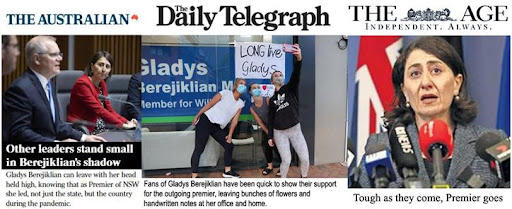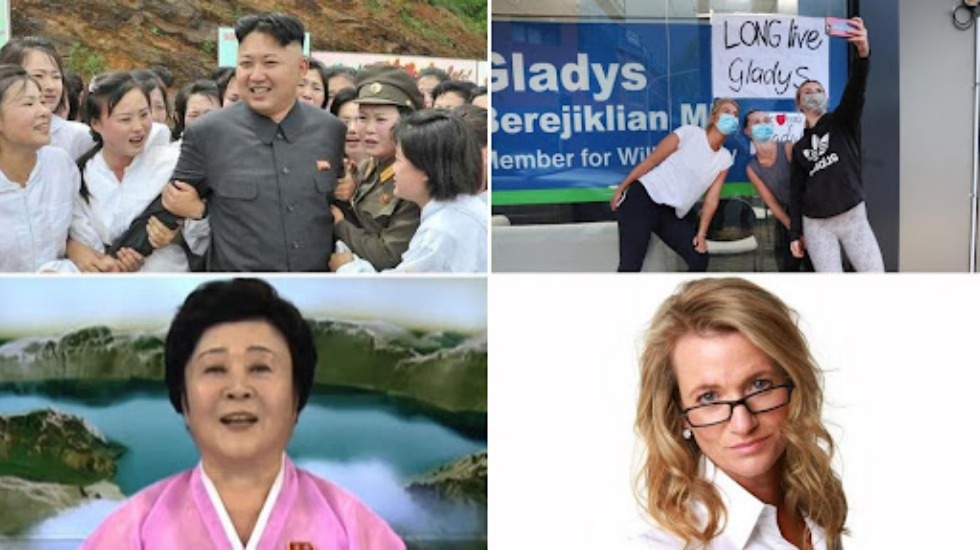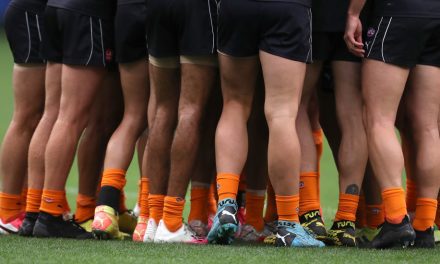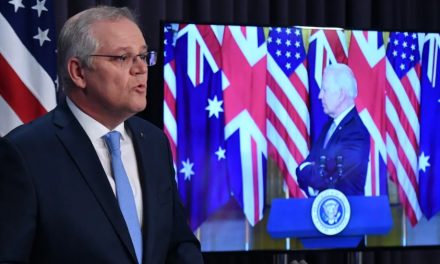Are our media and North Korea’s still poles apart? Photos (clockwise from top left) Reuters, Daily Telegraph, The Australian, The Guardian
For the longest time, students of journalism and newsroom cadets alike dared not overlook the six essential elements of a story: who, what, where, when, how and why.
The five ‘Ws’ (and one ‘H’) were what set evidence-based journalism apart from the propaganda one might get from North Korea’s infamous “Pyongyang Pam” (above, lower left).
Soviet-style misinformation was anathema to idealistic young would-be journos, many of whom saw their craft as a sacred responsibility to the truth, and more than just a career.
With such high-minded principles built into newsrooms across Australia, North Korea couldn’t possibly happen here, right? To some extent, it already has.
Consider Friday’s lead story across most of Australia’s media: the resignation of NSW premier Gladys Berejiklian, after the state’s corruption watchdog announced she was under investigation. The ‘who, what, where, when and how’ took care of themselves in the first paragraph or so, but news organisations’ handling of the biggest question – why? – would determine whether their coverage was more Edward R Murrow or “Pyongyang Pam”.
At lunchtime Friday, NSW’s Independent Commission Against Corruption (ICAC) announced it was investigating Berejiklian’s involvement in grants over the last decade to sporting and artistic groups in the town of Wagga Wagga. Disgraced former Wagga Wagga MP Daryl Maguire, who was in a secret relationship with Berejiklian, had lobbied for the money.
ICAC had been investigating Maguire since 2018 over his accepting of commissions from property developers, and his failure to disclose business interests. Maguire, who admitted he used his position for financial gain, was secretly taped with Berejiklian discussing the potential payday from another deal when she replied: “I don’t need to know about that bit.”
The biggest surprise, really, is that Berejiklian clung to her job as long as she did (Can you imagine Dan Andrews surviving this long under such a cloud with the Herald Sun baying for his blood?).
And so, the ‘why’ from this story is answered: Gladys Berejiklian knew she was doomed by the stench of corruption, so she resigned, not just as Premier but from parliament altogether. Clearly, ‘why’ is the biggest element of this story, a fact reflected in its coverage across Australia, surely.
What’s that? They buried it under other stuff? In many cases, the ‘why’ came a poor second to peripheral issues, lamentations that Berejiklian “worked damn hard” for her state, and attacks on those cheering her demise as “pissant”.
NSW has lost a fine leader in @GladysB who worked damn hard for this state. There will be some people in pissant jobs gloating. But Gladys has shown stellar leadership that other premiers haven’t and couldn’t muster.
— janet albrechtsen (@jkalbrechtsen) October 1, 2021
Janet Albrechtsen is a prominent commentator – one might say influencer – occupying a lofty perch at our national broadsheet, The Australian. From there, her agenda, and that of her proprietor, are amplified many times more powerfully than those of “pissants” old fashioned enough to see the ‘why’ of this story as the most important question.
The ‘Gladys Cheer Squad’ helmed by Albrechtsen was as big as Collingwood’s. Her News Corp colleague, Sharri Markson, referred to a “‘lynch mob’ taking down yet another leader”.
“ICAC has left NSW rudderless and has robbed the people of a popular premier at a time of crisis and uncertainty. A law unto themselves, ICAC is addicted to the power and publicity of the bombshell political scalp,” The Australian’s ‘investigations writer’ added.
Below is a brief, graphic summation of how our media (with few exceptions) covered Berejiklian’s downfall. The question of ‘why’ she resigned was well and truly relegated to the backblocks:

The Australian (left) focuses not on the ICAC inquiry, but on Berejiklian’s COVID-19 response, which it says “led the country” (in fact, her failure to promptly lock down NSW back in June “led the country” into another large-scale lockdown). Meanwhile, Sydney’s Daily Telegraph (middle) ran happy snaps of grateful constituents leaving flowers and thank-you notes outside Berejiklian’s office (a contrived photo op that would make Kim Jong-un blush).
Note that the above collage isn’t your usual catalogue of News Corp propaganda. It includes coverage by The Age, which as you can see still promotes itself as “Independent. Always.”
PLEASE HELP US CONTINUE TO THRIVE BY BECOMING AN OFFICIAL FOOTYOLOGY PATRON. JUST CLICK THIS LINK.
Here’s a link to an Age/Sydney Morning Herald article by former NSW LNP leader Peter Collins, which reads without a hint of irony:
You can tell a lot about a political leader by how they leave office. Gladys Berejiklian leaves with great class, writes former NSW Liberal leader Peter Collins. | OPINION #Gladys #ICAC https://t.co/66ab7wUp7o
— The Age (@theage) October 1, 2021
A closer look at The Age shows a page one story headlined, “Tough as they come, Premier goes”, the first paragraph of which portrays her as a profile in courage: “I’m not scared of anybody.”
The page one article then points to a more damning opinion piece by former ICAC counsel Geoffrey Watson … which was buried on page 33. It goes on to describe NSW cabinet ministers as “astonished that Gladys not only survived (the Maguire revelations) but went on to thrive, seemingly untouched by the scandal.”
I wonder how she managed that. Perhaps former Liberal Treasurer Peter Costello, non-executive chairman of The Age’s parent company, can help unravel the mystery.
Let’s back up for a moment and recap: senior pol showers lover’s electorate with government largesse and is caught on phone taps listening as said lover – whom she had hoped to marry – outlines a sketchy land deal and the windfall it would bring before adding: “I don’t need to know about that bit.” Apparently, there’s much more to come.
In most cases when a high official is under investigation, he or she steps aside pending its outcome; instead, Berejiklian resigned both from her position, and from parliament altogether. If that doesn’t spell out her situation, in big red capital letters, nothing will.
The abject failure of corporate media to give the ‘why’ in this scandal the top billing it deserves prompted outrage on Saturday, much of it from those who normally refrain from partisan comment. Perhaps ABC News 24 Breakfast presenter Michael Rowland – hardly a leftist firebrand – summed it up best:
I’m old enough to have covered politics when standards and integrity really counted.
Those days have long gone.
.@GladysB was right to resign in the face of such serious allegations.
And wouldn’t you be holding off the hagiographies until we see what happens in the inquiry?
— Michael Rowland (@mjrowland68) October 1, 2021
Tell me again how North Korea can’t possibly happen here.

“Democracy dies in Darkness,” the Washington Post proclaimed during the dark days of Donald Trump’s presidency. Cynics might think it’s a bit rich for an outlet owned by Amazon’s Jeff Bezos to proclaim itself a bulwark against the abyss – much like The Age still proclaims its “independence” – but this is the newspaper which brought down the nefarious Richard Nixon, and its reportage from 2016-20 tormented The Donald no end.
Democracy is indeed under threat, both in the US and here. In fact, former PM Malcolm Turnbull nowadays describes Australia as an oligarchy whose LNP political leadership serves the interests of magnates and allied media moguls, in return for protection by way of favourable press coverage.
“It is utterly unaccountable (and much of our media) is controlled by an American family (whose) interests are no longer, if they ever were, coextensive with our own,” Turnbull told the media diversity inquiry in April.
Democracy may die in darkness, but do you know what thrives there? Corruption, of the kind Gladys Berejiklian waltzed around, seemingly unperturbed, for years before some of its consequences finally caught up with her on Friday.
It’s worse at the Federal level, where there’s no ICAC. Thus, Bridget McKenzie – she of the “sports rorts” affair – found herself restored to Cabinet after a 16-month hiatus, following a scandal that should have seen her out of parliament at the very least.
Then there’s the billions in Community Development Grants or for new car parks, heavily concentrated on LNP or marginal seats, the $40 million grant to Murdoch’s Foxtel for “the broadcast of underrepresented sports” (nobody else got a cent), Dutton’s au pair affair, the Helloworld episode, the Austal investigation, the shenanigans of Christian Porter or Barnaby Joyce and the $5 million to LNP-aligned Crosby-Textor. There’s plenty more where that came from.
Much of this sketchiness was investigated by bodies not built for the task like an ICAC and unable to pierce the veil of government obstruction. If you haven’t heard of half of these scandals, don’t blame yourself: it’s not like it was all comprehensively covered in the corporate media.
It’s not hyperbolic to say this country’s in a lot of trouble, circling the same debauched drain that has claimed civilisations for millennia. The solution – in part – involves media diversity (of opinion and ownership) and the accountability of politicians and bureaucrats.
There’s a Federal election coming up. Choose wisely.












Great article. No doubt we’ll hear a lot more about the Labor branch stacking in Victoria than we heard about this. Not a big fan of Turnbull but his quote in her is spot on. We still have time – just got to cut through and get the message to the people who vote which will require getting them to look further than Google News, and through the ridiculously chosen headlines for clickbait. I still have faith it can happen (but it’s wavering).
Brilliant article Andrew. Downright frightening and sadly we have non one in politics with the balls to fight it.